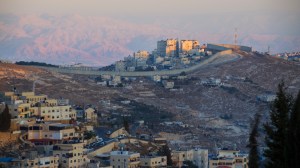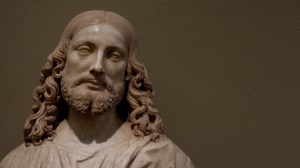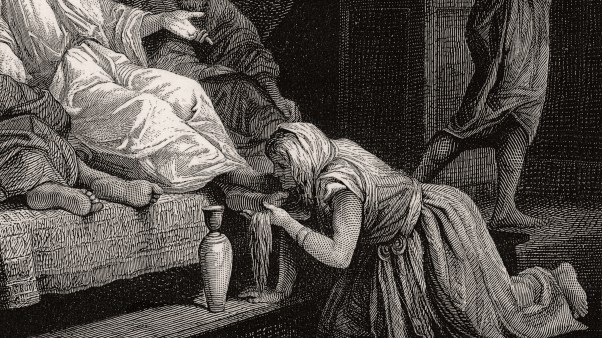In this series
During the reign of Herod the Great, two teachers persuaded several young men to clamber up on the temple gates and cut down a golden eagle the king had mounted in honor of his Roman overlords. Herod was so enraged, he had the teachers and the youths burned alive.
Such was the political climate of first-century Palestine. The land seemed to be at peace, but it was a Pax Romana, a peace vigilantly guarded by legions of Roman soldiers charged with squelching any hint of rebellion.
Not everyone was upset with the Roman imposition, of course. Many had even prospered from it. So Palestinian Jews were as diverse in their opinions as they were in their languages: Greek, Hebrew, Aramaic, Latin, and (to the east) Nabatean.
And this diversity led to inevitable conflict.
Long hostilities
Romans were not the only "enemies" of traditional Jews. Sandwiched between the Jewish districts of Judea and Galilee lay the hill country of Samaria.
Tensions between Jews and Samaritans can be traced back to the ninth century B.C. (after Solomon's death), when the northern tribes rebelled from the Jerusalem monarchy and formed their own kingdom. The two rival states, Israel and Judah, fought for centuries.
Samaritan-Judean hostilities increased dramatically when Hyrcanus I, one of the Jewish kings whose dynasty had been founded by the Maccabean family (Hasmonaeans), destroyed the Samaritan temple at Mount Gerizim in 128 B.C.
The Samaritans exacted violent revenge, defiling the Jewish temple with human bones and attacking a festival-bound caravan of Galileans. The Jews responded in kind. The Samaritans fought back again.
The Jews' hatred of Samaritans grew stronger over time. To be called a Samaritan was a grievous insult, (Jesus was accused of being "a Samaritan and demon-possessed"—John 8:48). Some rabbis said that to eat the bread of Samaritans was to eat pork, or to marry a Samaritan was to lie with a beast.
Jews believed Samaritans were, at best, only partially Jewish. Instead, they believed Samaritans were Gentiles descended from the old Assyrian Empire.
The Samaritans, however, believed that they were descendants of the northern tribes and that only the "Law of Moses" (more or less the Pentateuch) constituted true Scripture. Anything not written by Moses (whom they believed was "the light of the world") was rejected. Because they thus rejected much of Jewish law, non-Samaritan Jews thought Samaritans morally negligent.
Among those most hostile to the Samaritans were the Hasidaeans, whose name means "pious ones." They believed sacrifice should be made in Jerusalem and only Jerusalem, so the Samaritan belief in the sacredness of Mount Gerizim was ridiculous to them. They were primarily teachers and interpreters of the Torah and soon allied themselves with the anti-Samaritan and anti-Roman Hasmonaeans.
Three rivals
The Hasidaeans may have been united in their hatred of the Samaritans, but they soon found themselves divided over other issues. From this one religio-political group came three rivals: the Sadducees, the Pharisees, and the Essenes.
The Sadducees were a small group, whose more conservative views greatly influenced the ruling priests. Unlike their rivals, they accepted the political status quo. Indeed, because of their influence and political clout, they worked hard to preserve it. With the ruling priests, they collaborated with Rome to manage Judea. In return for their cooperation (which consisted primarily of maintaining law and order and collecting the Roman tribute), Rome gave them preferential treatment and helped them hold on to their power.
The Sadducees were the Deists and Pelagians of their day. They believed in the remoteness of God from the created order and were staunch advocates of free will: "They take away fate entirely," wrote the Jewish historian Josephus, "and say there is no such thing, and that the events of human affairs are not at its disposal; but they suppose that all our actions are in our own power, so that we are ourselves the causes of what is good, and receive what is evil from our own folly."
They also accepted the authority of the written law but rejected the oral traditions held dear by the earlier Hasidaeans and their principal political and religious rivals, the Pharisees. They also rejected the idea of resurrection and the existence of angels.
Josephus also noted that the sect "take[s] away the belief of the immortal duration of the soul, and the punishments and rewards in Hades." They were inclined to be severe and quick in their judgments, but because of public pressure, they usually followed the policies of the more tolerant Pharisees. The Sadducees, Josephus noted, "are able to persuade none but the rich, and have not the populace obsequious to them."
The Pharisees, on the other hand, were a larger and more popular party. They accepted and expanded the oral traditions. Because of their zeal for the holiness code (especially that of Leviticus), they emphasized purity and separation from those who did not observe their practices. Unlike the Sadducees, the Pharisees believed in resurrection and in angels. As to free will, Josephus puts them between the fatalistic Essenes and the free-will Sadducees: they ascribed everything to "fate" and God's providence, yet they believed the power to do good or evil "is principally in the power of men, although fate does cooperate in every action."
In contrast to the Sadducees, the Pharisees did not collaborate with Rome. Indeed, Josephus records, "A cunning sect they were and soon elevated to a pitch of open fighting and doing mischief. Accordingly, when all the people of the Jews gave assurance of their good will to Caesar, and to the king's government, these very men [about 6,000] did not swear." Josephus also chronicles their prophecy that the throne would someday be taken from Herod the Great—a probable allusion to the coming of the Messiah. When Herod learned of it, he put several Pharisees to death.
The Pharisees' rebelliousness may be traced back to the days of the Hasmonaean dynasty. On one occasion, convinced that the priest-king Alexander Jannaeus was not qualified to offer up sacrifice, Pharisees incited the crowd to pelt their ruler with lemons that had been gathered for the festival.
Thanks to the discovery of the Dead Sea Scrolls, the Essenes have become the most talked about and controversial of the parties mentioned by Josephus. We are told that the Essenes formed their own communities, sometimes in the wilderness, shared their possessions, observed strict interpretations of the law, and were mostly celibate. This group was so strict that to spit, to talk out of turn, or to laugh loudly was punished with a reduction in one's food allowance.
Most scholars assume that the Dead Sea Scrolls represent an Essene library, with many of the scrolls actually produced by the group. The scrolls reveal a community concerned with end times, in which it would be vindicated and would assume leadership over the temple.
The scrolls depict a great final war between the "sons of light" (the Essenes and pious Jews who joined them) and the "sons of darkness" (the Romans and faithless Jews who collaborated with them). One scroll may actually describe a confrontation in which the Messiah slays the Roman emperor.
Of the three Jewish parties, early Christians seem to have had the most in common with the Essenes. Curiously, however, the Essenes are never mentioned anywhere in the New Testament.
Other groups?
Josephus also wrote of a "fourth philosophy," but he was probably not actually describing another party or sect, like the Sadducees or the Pharisees (which he also calls "philosophies"). Instead he described a social and political tactic adopted by some (including Pharisees) whereby violence was used against collaborators with Rome.
The zealots were a coalition of rebel groups that formed during the great revolt against Rome in A.D. 66-70. Those who embraced the tactics of the fourth philosophy included the sicarii, or "men of the dagger." These assassins often attacked in broad daylight, in the midst of large crowds. After plunging in the knife, they shouted cries of outrage and calls for assistance as the victim fell. By this subterfuge, they were not often detected or apprehended. On one occasion the sicarii kidnapped a secretary of one of the ruling priests, demanding that ten of their associates be released from prison.
False messiahs
Most Jews' biggest problem was Roman domination. The Pharisees believed that deliverance would come through scrupulous observance of the law, including their oral traditions—their "fence" erected around the law. Though some were violent, most were probably passive in their criticism of the Herodians and the Romans. Essenes also hoped for revolution, but they looked to heaven in anticipation of a dramatic and final moment when prophecies would be fulfilled.
Some individuals, though, took it upon themselves to usher in the awaited new age. Following the death of Herod the Great, several men attempted to place the crown upon their own heads. One or two of these figures may have thought of themselves as David-like figures, perhaps even in messianic terms. Simon of Perea, a tall and attractive former slave of Herod, plundered and burned the royal palace in Jericho but was quickly conquered. Athronges, the shepherd of Judea, was little known but "remarkable for his great stature and feats of strength." He ruled over parts of Judea for more than two years before being subdued by the Romans.
A generation later prophets supplanted political rulers. The first was Theudas, who "persuaded a great part of the people to take their effects with them and follow him to the river Jordan; for he told them … he would, by his own command, divide the river and afford them an easy passage over it, and many were deluded by his words." This Joshua-like act was probably intended as a confirming sign not only of Theudas's true prophetic status but of the beginning of a new conquest of the Promised Land, whereby Israel's poor and marginalized would regain their lost patrimony. But the Roman governor dispatched the cavalry, which made short work of Theudas and his band of followers. Many were killed, and the head of the prophet was mounted on a pole by one of the gates of Jerusalem.
A decade later, a Jew from Egypt, "who declared that he was a prophet," persuaded many to join him atop the Mount of Olives, where at his command the walls of Jerusalem, as in the days of Joshua, would collapse providing his following entry into and possession of the holy city. Once again Roman soldiers attacked, and although 400 Jews were killed and another 200 were taken prisoner, the Egyptian Jew somehow escaped. (The apostle Paul was once asked if he was this fugitive—Acts 21:38.)
As for Jesus, he actually had much in common with the Pharisees, but he criticized and threatened them at least as much as any other group. These threats and talk of the disciples sitting on 12 thrones judging the 12 tribes of Israel clearly implied a change in administration, something intolerable to the ruling priests and their Roman masters. Given the ethnic and religious tensions of the times, it's not hard to see why, from a purely political perspective, Jesus' death was necessary.
Craig Evans is professor of biblical studies at Trinity Western University in Langley, British Columbia, and author of numerous books and articles on Jesus and the Gospels.
Copyright © 1998 by the author or Christianity Today/Christian History magazine. Click here for reprint information on Christian History.















